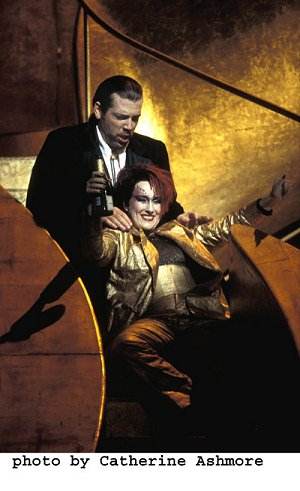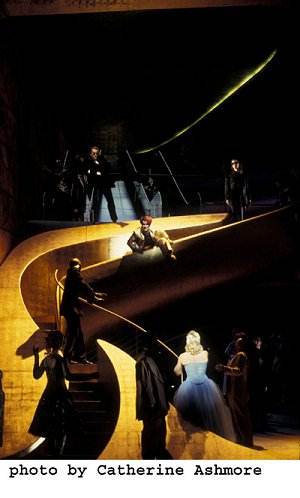Richard Strauss, ‘Arabella’ Soloists, Orchestra of the Royal Opera House, cond. Christoph von Dohnanyi, Royal Opera House Covent Garden, May 27th 2004 (ME)
The singing is absolutely marvellous. The production is absolute crap. (Is that it? Ed.)
Yes, that just about sums it up, but since some of my esteemed colleagues appear not to have been able to say much more about the singing than ‘Thomas Hampson sang Mandryka’ (poor Hampson – I recall that one supposedly respected publication only managed to deliver itself of the phrase ‘…was a thoughtful Amfortas’ in assessing his searing performance in that role…) I think a little detail is warranted.
It is, of course, commonplace to regard Arabella as the poor relation of Rosenkavalier, but there is more to it than that: the later work is no more silly than the earlier, in my view, and it has no fewer episodes of great music – indeed, I would describe Arabella as above all a hymn of love to the soprano and baritone voices, that hymn of love being about as finely sung here as anyone could ask for.
Karita Mattila has everything: despite the fact that she was forced to act like a ninny for most of the time, she created a believable heroine about whom her sister’s loving words in Act 1 genuinely made sense, and her singing set the pulse racing at almost every line – ‘aber der Richtige’ delivered with real fervour, ‘Mein Elemer!’ fascinatingly varied in tone, ‘auf dem die Sonne blitzt!’ heart-stopping despite the high note not being quite spot on, and ‘und diesen unberührten Trank…’ as precisely enunciated, totally convincing and utterly lovely in tone as if she had just come on stage for the first time that evening.

Mattila differs from every other Arabella I have heard (including Lisa Della Casa) in that it is not just the soaring beauty of the voice that impresses, but the attention given to the dialogue: where a Te Kanawa, say, will deliver a line like ‘Zdenkerl, du hast schon ganz die exaltierten Ton von der Mama!’ in a rather casual way, Mattila is able to give it real bite and to use it to advance our appreciation of the character. This was a stunning performance from a genuinely great singer, disgracefully hampered by a ludicrous production which worked against her at every turn – but more (although as little as possible) of that later.
Hampson’s Mandryka was of similar artistic stature: this was the first time I have heard him in the role, and I had not thought him ideal for it, but I was wrong – he is perfection, truly ‘der einzige Mandryka.’ He caught exactly the right sense of a man who is ‘ein halber Bauer’ yet who possesses the most delicate of sensibilities – his ‘Das ist ein Fall von anderer Art’ has to be one of my great moments of opera – and his singing was a joy from first to last, especially in ‘Ich habe eine Frau…’ Like Mattila, he made every moment of his spoken part alive with significance; when Waldner says that he just wanted to amuse the old man, Hampson’s ‘Dem Onkel einen Spass?’ so vividly shows that here is a man for whom a joke on such a matter is unthinkable.
Barbara Bonney was of course perfectly cast as Zdenka, her inherently touching timbre so ideal for her music: she created a totally believable figure against the odds, not only of the character but the production, which seemed to want to make a joke of her situation. Her outbursts at crucial points, such as the moment where she tells Arabella that Matteo loves her with his whole soul, were so heart-rending that it was quite easy to see her as ‘die Bessere von uns zweien.’ Arabella’s hapless suitors (some of them idiotically conceived here as shades-sporting look-alikes) were all superbly sung, with Raymond Very a huge success as Matteo, bringing to mind René Kollo at his best, and John Daszak a sympathetic Elemer – ‘Das Andere wird kommen…’ displayed a genuinely heroic, ringing tone. The rest of the cast were merely adequate, although of course it’s hard to tell what really sensitive direction could have done with them.

Plenty of nonsense has been written about this production: all that needs to be said is that the set is a cross between a Milwaukee shopping mall (except for the fact that in the latter, the escalators would go somewhere) and the lobby of the Parker Meridien hotel on W 57th in New York (except that there, the stairs are wide enough for your ball gown, and of course the staff do what they are there to do, as opposed to crass gallimaufry). Additionally, if you sat beyond, say, row D in the Amphitheatre, you would be looking at the singers from the waist down only; the singers are also forced to squeeze themselves into silly and/or uncomfortable positions to sing music that is already quite challenging enough. Just one example must suffice (hard though it is to miss out on all that could be said about the way in which what Hampson and Mattila are made to do at the ending works totally against the music.) In Act 2, Arabella and Mandryka sing a sublime duet in which they plight their troth, uttering such sentiments as ‘dein Haus, wird mein Haus sein’ – and whilst they do this, Arabella is here crammed (in her puffy gown) into the last step on the stairs, whilst her betrothed is perched five steps above her, singing down onto her hair – so whilst they vow that they will be buried in the same grave, in tones of the most utterly melting tenderness, they neither look at nor touch each other. No comment.
I am not a fuddy-duddy traditionalist – I loved the much-criticized ENO ‘Don Giovanni’ and ‘Ballo,’ because in both productions the director actually knew how to manage singing actors and how to stage the conflicts between them. The present production reveals no such knowledge, and whilst writing of lack of knowledge, it’s a great pity that before printing their programme, the Royal Opera could not find someone who actually knows what singers of the stature of Dietrich Fischer-Dieskau and Alexander Young look (ed) like, since the photograph on page 44 shows, not the former as Mandryka, as we are informed, but in fact the latter as Matteo. That the present singers are the equals of those great artists only underlines one’s disappointment that this production is not worthy of them.
Melanie Eskenazi
PHOTO CREDIT: CATHERINE ASHMORE
ARABELLA by Richard Strauss
Royal Opera 05/04
THOMAS HAMPSON as Mandryka
DIANA DAMRAU as Fiakermilli
Conductor: Christoph Von Dohnanyi
Director: Peter Mussbach
Set Designs: Erich Wonder
Costume Designs: Andrea Schmidt-Futterer
Lighting: Alexander Koppelmann
 Return to:
Return to: